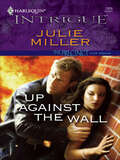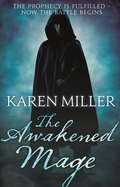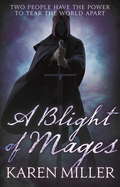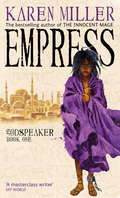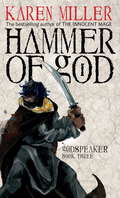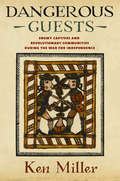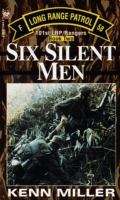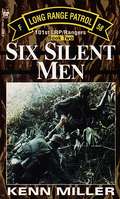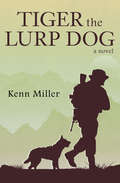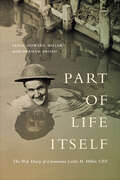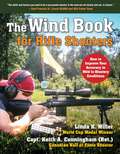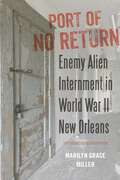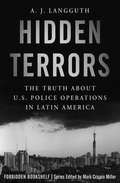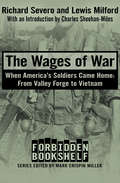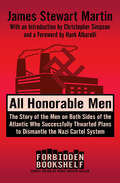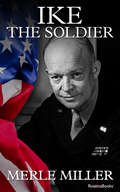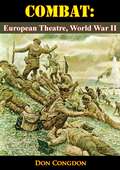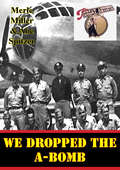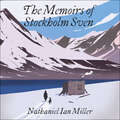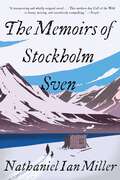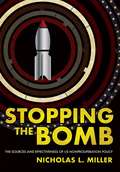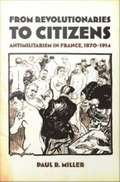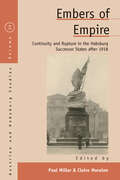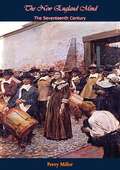- Table View
- List View
Up Against the Wall (The\precinct: Vice Squad Ser. #1)
by Julie MillerHe was built like a tank, and he was undercover inKansas City's seediest district. Waist-deep in the troublethat came along with the Vice Squad, Seth Cartwright hadunwanted company.After several years, investigative reporter Rebecca Page wasfi nally getting her chance to uncover the truth behind herfather's death-if she could swing Seth to her side.There was no debating that Seth ignited her temper, alongwith something else at her core. He said he was no longera cop, though Rebecca suspected there was more to Seththan met the eye. And awaiting them was a deadly secretthat KC's most ruthless criminal minds will do anything tokeep buried deep forever.
The Awakened Mage: Kingmaker, Kingbreaker: Book 2 (Kingmaker, Kingbreaker #2)
by Karen Miller'A writer who seems to set the rule for the genre' - Waterstones Books Quarterly'Miller is clearly a very talented writer: her characterisation is a masterclass in nuance and sensitivity, and she has a visceral way with action' - SFXPrince Gar now has the magic for weatherworking and is able to keep his enemies at bay, while Asher has become the most powerful Olken in the history of Lur. Peace and prosperity seem assured for the two of them. But Morg, the evil sorcerer mage, remains trapped inside a shattered body. He knows his time is running out and that desperate measures are called for.Unwittingly, Gar and Asher become caught up in a dangerous deception which threatens to tear apart the kingdom and destroy the fragile balance between Olken and Doranen.And no one, not even Dathne and her secret Circle, is prepared for the consequences when the Innocent Mage is revealed at last . . .Following The Innocent Mage, this is the second and concluding volume in the bestselling Kingmaker, Kingbreaker series - a wildly fast-paced fantasy brimming with action and adventure.Books by Karen Miller:Kingmaker, Kingbreaker SeriesThe Innocent MageThe Awakened MageA Blight of MagesGodspeakerEmpress of MijakThe Riven KingdomThe Hammer of GodFisherman's ChildrenThe Prodigal MageThe Reluctant MageTarnished CrownThe Falcon ThronePrince of Glass
A Blight of Mages: Kingmaker, Kingbreaker: Book 3 (Kingmaker, Kingbreaker #3)
by Karen Miller'A writer who seems set to rule the genre' - Waterstones Books Quarterly'A Blight of Mages is an intoxicating and heart-wrenching story depicting two young people torn by desire and ability' - British Fantasy SocietyHundreds of years before the great Mage War, a land lies, unknowing, on the edge of catastrophe . . .Barl is young, impulsive and wants to explore her raw magical potential. But Dorana's rigid class system means that only those with the right pedigree are trained. Desperate to learn, Barl lets her eagerness lead her to rebellion and disgrace. She faces the possibility of never using her powers again - until she meets Morgan Danfey, who sits on the Mage Council itself.Together, they realise they can create an extraordinary new magic. But the lure of this great power reveals a darkness in Morgan which will bring their land to its knees.From the bestselling Karen Miller comes a compelling fantasy novel set in the world before The Innocent Mage - the age before the great Mage War . . .Books by Karen Miller:Kingmaker, Kingbreaker SeriesThe Innocent MageThe Awakened MageA Blight of MagesGodspeakerEmpress of MijakThe Riven KingdomThe Hammer of GodFisherman's ChildrenThe Prodigal MageThe Reluctant MageTarnished CrownThe Falcon ThronePrince of Glass
Empress: Godspeaker: Book One (Godspeaker #1)
by Karen Miller'Empress is an ambitious, impressive and intriguing novel' - Starburst'A fine read and a fine start to what could be an exceptional series.' - The Contra Costa Sunday TimesWhen a scrawny, unwanted child - so lowly that she does not even have a name - is sold into slavery, a chain of events is set in motion that will have a profound impact on all the civilised world.Naming herself 'Hekat' (after a slaver's observation that she is quite the hellcat), the girl is taken in chains to Mijak's largest city, but makes a bargain with a ruthless god and escapes her captors. After she saves the life of a warlord, he takes her in and teaches her ways that an orphan might use to prosper in an uncaring world.When the warlord's family dies, the way becomes clear for Hekat to carve a dynasty out of infidelity and betrayal. . .Empress is an epic fantasy of power, politics and the rise and fall of empires.Books by Karen Miller:Kingmaker, Kingbreaker SeriesThe Innocent MageThe Awakened MageA Blight of MagesGodspeakerThe Riven KingdomThe Hammer of GodFisherman's ChildrenThe Prodigal MageThe Reluctant MageTarnished CrownThe Falcon ThronePrince of Glass
Hammer of God: Godspeaker: Book Three (Godspeaker #3)
by Karen Miller'A writer who seems to set the rule for the genre' - WATERSTONE'S BOOKS QUARTERLY'Top-notch fantasy . . . a masterclass writer' - SFFWORLDIn Ethrea, Rhian sits upon a precarious throne. Defiant noblemen who won't accept her rule threaten the stability of her kingdom, Zandakar, a man she thought was her friend, has been revealed as the son of a woman sworn to destroy her and her husband, King Alasdair, is increasingly unsure of her love.Rhian's most grave problem, however, lay outside the borders of her realm. The trading nations refuse to believe Mijak is a threat and promise reprisals if she dares to protect her realm. If she cannot unite the warring factions within her land, a move again Mijak might prove the end of her reign. Which is exactly what the empress of Mijak has planned. . .The third volume of Karen Miller's epic fantasy of power, politics and the rise and fall of empires . . .Books by Karen Miller:Kingmaker, Kingbreaker SeriesThe Innocent MageThe Awakened MageA Blight of MagesGodspeakerEmpress of MijakThe Riven KingdomFisherman's ChildrenThe Prodigal MageThe Reluctant MageTarnished CrownThe Falcon ThronePrince of Glass
Dangerous Guests: Enemy Captives and Revolutionary Communities during the War for Independence
by Ken MillerIn Dangerous Guests, Ken Miller reveals how wartime pressures nurtured a budding patriotism in the ethnically diverse revolutionary community of Lancaster, Pennsylvania. During the War for Independence, American revolutionaries held more than thirteen thousand prisoners—both British regulars and their so-called Hessian auxiliaries—in makeshift detention camps far from the fighting. As the Americans' principal site for incarcerating enemy prisoners of war, Lancaster stood at the nexus of two vastly different revolutionary worlds: one national, the other intensely local. Captives came under the control of local officials loosely supervised by state and national authorities. Concentrating the prisoners in the heart of their communities brought the revolutionaries’ enemies to their doorstep, with residents now facing a daily war at home. Many prisoners openly defied their hosts, fleeing, plotting, and rebelling, often with the clandestine support of local loyalists. By early 1779, General George Washington, furious over the captives’ ongoing attempts to subvert the American war effort, branded them "dangerous guests in the bowels of our Country." The challenge of creating an autonomous national identity in the newly emerging United States was nowhere more evident than in Lancaster, where the establishment of a detention camp served as a flashpoint for new conflict in a community already unsettled by stark ethnic, linguistic, and religious differences. Many Lancaster residents soon sympathized with the Hessians detained in their town while the loyalist population considered the British detainees to be the true patriots of the war. Miller demonstrates that in Lancaster, the notably local character of the war reinforced not only preoccupations with internal security but also novel commitments to cause and country.
Six Silent Men
by Kenn MillerFROM THE BACK COVER: 1/101 LRRP Detachment: "A scruffy crew of cocky scofflaws..." In the summer of 1967, the good old days were ending for the hardcore 1st Brigade LRRP's of the 101st Airborne Division, perhaps the finest maneuver element of its size in the history of the United States Army. It was a bitter pill. After working on their own in Vietnam for more than two years, the Brigade LRRPs were ordered to join forces with the division once again. But even as these formidable hunters and killers were themselves swallowed up by the Screaming Eagles' Division LRPs to eventually become F Co LRRP tradition. From saturation patrols along the Lao border to near- suicide missions and compromised positions in the always dangerous Ashau Valley, the F/58 unflinchingly faced death every day and became one of the most highly decorated companies in the history of the 101st.
Six Silent Men, Book Two (101st LRP Rangers #2)
by Kenn MillerIn the summer of 1967, the good old days were ending for the hard-core 1st Brigade LRRPs of the 101st Airborne Division, perhaps the finest maneuver element of its size in the history of the United States Army. It was a bitter pill. After working on their own in Vietnam for more than two years, the Brigade LRRPs were ordered to join forces with the division once again.But even as these formidable hunters and killers were themselves swallowed up by the Screaming Eagles' Division LRPs to eventually become F Co., 58th Infantry, they continued the deadly, daring LRRP tradition. From saturation patrols along the Laotian border to near-suicide missions and compromised positions in the always dangerous A Shau valley, the F/58th unflinchingly faced death every day and became one of the most highly decorated companies in the history of the 101st.From the Paperback edition.
Tiger the Lurp Dog: A Novel
by Kenn MillerA landmark novel of the Vietnam WarThe men of the Long-Range Reconnaissance Patrol—Stagg, Wolverine, Mopar, Marvel Kim, and Gonzales—are commando-style soldiers, called &“Lurps&” for short. Five men, completely dependent on one another. Proud to the point of arrogance. They&’re joined by Tiger, their mascot: a flea-bitten scavenging stray or &“dust dog,&” a sneak and a coward, lazy and haughty. But, like his masters in this dirtiest of all wars, a survivor.When their buddies on Team Two-One disappear, the Lurp team members have to fight their own brass to go on a mission to find them. And suddenly a grueling war becomes an unimaginable nightmare.
Part of Life Itself: The War Diary of Lieutenant Leslie Howard Miller, CEF (The Canadian Experience of War)
by Leslie MillerThis extensively annotated wartime diary illuminates the military service of Leslie Howard Miller (1889–1979), a Canadian soldier who served in the First World War. Miller joined the Canadian Expeditionary Force (CEF) in 1914. In his off-duty hours, he kept this extraordinarily eloquent diary of his training, deployment overseas, service on the Western Front, and periods of leave in the United Kingdom. Graham Broad, working from a transcription of the diary produced by Miller’s family, includes a thorough introduction and afterword, as well as over 500 notes that situate and explain Miller’s many references to the people, places, and events he encountered. Unpublished for over a century, written in bracing and engaging prose, and illustrated with Miller’s own drawings and unseen photographs, Part of Life Itself illuminates a bygone world and stands as one of Canada’s most important wartime diaries.
The Wind Book for Rifle Shooters: How to Improve Your Accuracy in Mild to Blustery Conditions
by Linda K. Miller Keith A. CunninghamAll other factors being equal, it is your ability to read the wind that will make the most difference in your shooting accuracy. The better you understand the behavior of the wind, the better you will understand the behavior of your bullet. Now, champion shooters Linda K. Miller and Keith A. Cunningham reveal everything they wish they&’d known about reading the wind before they started shooting (instead of having to learn as they went along) in concise, easy-to-read terms and accompanied with handy ninety-five diagrams. The Wind Book for Rifle Shooters contains straightforward guidance on the simple thought process they use to read the wind, the techniques and tactics they use to win matches, and the underlying skills that support both. Let these champions show you how to put together a simple wind-reading toolbox for calculating wind speed, direction, deflection, and drift. Then learn how to use these tools to read flags and mirage, record and interpret your observations, and time your shots to compensate for wind. Other topics covered include: Analyzing shot placementRecording and record keepingConfidence and following your hunchesAnd much more!The essential wind-reading basics taught in this book will absolutely improve your shooting skills, whether you're a target shooter, a plinker, a hunter or a shooting professional.
Port of No Return: Enemy Alien Internment in World War II New Orleans
by Marilyn G. MillerWhile most people are aware of the World War II internment of thousands of Japanese citizens and residents of the United States, few know that Germans, Austrians, and Italians were also apprehended and held in internment camps under the terms of the Enemy Alien Control Program. Port of No Return tells the story of New Orleans’s key role in this complex secret operation through the lens of Camp Algiers, located just three miles from downtown New Orleans.Deemed to be one of two principal ports through which enemy aliens might enter the United States, New Orleans saw the arrival of thousands of Latin American detainees during the war years. Some were processed there by the Immigration and Naturalization Service before traveling on to other detention facilities, while others spent years imprisoned at Camp Algiers. In 1943, a contingent of Jewish refugees, some of them already survivors of concentration camps in Europe, were transferred to Camp Algiers in the wake of tensions at other internment sites that housed both refugees and Nazis. The presence of this group earned Camp Algiers the nickname “Camp of the Innocents.”Despite the sinister overtones of the “enemy alien” classification, most of those detained were civilians who possessed no criminal record and had escaped difficult economic or political situations in their countries of origin by finding a refuge in Latin America. While the deportees had been assured that their stay in the United States would be short, such was rarely the case. Few of those deported to the U.S. during World War II were able to return to their countries of residence, either because their businesses and properties had been confiscated or because their home governments rejected their requests for reentry. Some were even repatriated to their countries of origin, a possibility that horrified Jews and others who had suffered under the Nazis. Port of No Return tells the varied, fascinating stories of these internees and their lives in Camp Algiers.
Hidden Terrors: The Truth About U.S. Police Operations in Latin America (Forbidden Bookshelf #27)
by Mark Crispin Miller A. J. LangguthA “devastating” exposé of the United States’ Latin American policy and the infamous career and assassination of agent Dan Mitrione (Kirkus Reviews). In 1960, former Richmond, Indiana, police chief Dan Mitrione moved to Brazil to begin a new career with the United States Agency for International Development. During his ten years with the USAID, Mitrione trained and oversaw foreign police forces in extreme counterinsurgency tactics—including torture—aimed at stomping out communism across South America. Though he was only a foot soldier in a larger secret campaign, he became a symbol of America’s brutal interventionism when he was kidnapped and executed by Tupamaro rebels in Montevideo, Uruguay. In Hidden Terrors, former New York Times Saigon bureau chief A. J. Langguth chronicles with chilling detail Mitrione’s work for the USAID on the ground in South America and Washington, DC, where he shared his expertise. Along the way, Langguth provides an authoritative overview of America’s efforts to destabilize communist movements and prop up military dictators in South America, presenting a “powerful indictment of what the United States helped to bring about in this hemisphere” (The New York Times). Even today, the tactics Mitrione helped develop continue to influence operations in Guantanamo Bay, Cuba, and black sites around the globe.
The Wages of War: When America's Soldiers Came Home: From Valley Forge to Vietnam (Forbidden Bookshelf #20)
by Mark Crispin Miller Richard Severo Lewis Milford Charles Sheehan-MilesA disturbing chronicle of the US government's mistreatment of American soldiers and veterans throughout history, with a new introduction by Charles Sheehan-Miles Time and time again, the sacrifices made by veterans and their families have been repaid with scorn, discrimination, lack of health services, scant financial compensation, and other indignities. This injustice dates back as far as the American Revolution, when troops came home penniless and without prospects for work, yet had to wait decades before the government paid them the wages they were owed. When soldiers returned from the Cuban campaign after the Spanish-American War, they were riddled with malaria, typhoid, yellow fever, and dysentery--but the government refused to acknowledge their illnesses, and finally dumped them in a makeshift tent city on Long Island, where they were left to starve and die. Perhaps the most infamous case of disgraceful behavior toward veterans happened after the Vietnam War, when soldiers were forced to battle bureaucrats and lawyers, and suffer media slander, because they asked the government and chemical industry to help them cope with the toxic aftereffects of Agent Orange. In The Wages of War, authors Richard Severo and Lewis Milford not only uncover new information about the controversial use of this defoliant in Vietnam and the subsequent class action suit brought against its manufacturers, but also present fresh information on every war in US history. The result is exhaustive proof that--save for the treatment of soldiers in the aftermath of World War II--the government's behavior towards American servicemen has been more like that of "a slippery insurance company than a policy rooted in the idea of justice and fair reward."
All Honorable Men: The Story of the Men on Both Sides of the Atlantic Who Successfully Thwarted Plans to Dismantle the Nazi Cartel System (Forbidden Bookshelf #21)
by Mark Crispin Miller Christopher Simpson Hank Albarelli Jr. James Stewart MartinA scathing attack on Wall Street's illegal ties to Nazi Germany before WWII--and the postwar whitewashing of Nazi business leaders by the US government Prior to World War II, German industry was controlled by an elite group who had used their money and influence to help bring the Nazi Party to power. After the Allies had successfully occupied Germany and removed the Third Reich, the process of reconstructing the devastated nation's economy began under supervision of the US government. James Stewart Martin, who had assisted the Allied forces in targeting key areas of German industry for aerial bombardment, returned to Germany as the director of the Division for Investigation of Cartels and External Assets in American Military Government, a position he held until 1947. Martin was to break up the industrial machine these cartels controlled and investigate their ties to Wall Street. What he discovered was shocking. Many American corporations had done business with German corporations who helped fund the Nazi Party, despite knowing what their money was supporting. Effectively, Wall Street's greed had led them to aid Hitler and hinder the Allied effort. Martin's efforts at decartelization were unsuccessful though, largely due to hindrance from his superior officer, an investment banker in peacetime. In conclusion, he said, "We had not been stopped in Germany by German business. We had been stopped in Germany by American business." This exposé on economic warfare, Wall Street, and America's military industrial complex includes a new introduction by Christopher Simpson, author of Blowback:America's Recruitment of Nazis and Its Destructive Impact on Our Domestic and Foreign Policy, and a new foreword from investigative journalist Hank Albarelli.
Ike the Soldier
by Merle MillerFrom the bestselling author of Plain Speaking and Lyndon comes this &“vivid and consistently absorbing record of Dwight D. Eisenhower&’s military career&” (Kirkus Reviews). Bringing together thousands of hours of interviews with the men and women who were closest to him, Merle Miller has constructed a revealing and personal biography of the man who would become the supreme commander. From his childhood in Kansas to West Point, World War I, and Europe where he led the Allied Forces to a hard-won victory in World War II, Ike the Soldier goes behind the historic battles and into the heart and mind of Ike Eisenhower. Miller has crafted the defining biography on the life of the thirty-fourth president, bringing more depth to the man many thought they knew. His strained relationships with his father, brothers, and son are brought into focus; as well as his love affair with his wife Mamie, and his relationship with Kay Summersby—his driver turned companion and confidante during WWII. &“An informed and balanced tribute to a world-class leader whose remarkable character gains greater luster with the passage of time.&” —Kirkus Reviews &“This is a highly enjoyable look at Ike&’s personal and official relationships with the people most important to him during the first 55 years of his life, including family, Army and Allied colleagues and heads of state.&” —Publishers Weekly
Combat: European Theatre, World War II (American Civil War Ser.)
by Merle Miller Don CongdonFrom El Alamein to the breaching of the Siegfried Line, here are the major battles, unforgettably recorded by the men who fought them.EUROPEAN THEATER, 1940 to 1945From the over-all view of grand strategy to the fox-hole view of the individual rifleman, these authoritative accounts recreate with immediacy and in full dimension the historic battle for Europe.THE CHASE OF THE BISMARCKBEHIND ROMMEL'S LINESATTACK AT EL ALAMEINRAID ON REGENSBURGTHE BATTLE FOR CASSINOANZIO TO ROMEAIR DROP ON NORMANDYOMAHA BEACHBREAKOUT AT ST. LÔTHE HÜRTGEN FORESTBASTOGNE THE CAPTURE OF REMAGEN BRIDGESMASHING THE SIEGFRIED LINEand other battlesComplete with maps and running commentary, this is a companion volume to COMBAT: PACIFIC THEATER-WORLD WAR II.
We Dropped The A-Bomb
by Merle Miller Abe SpitzerThe amazing story of the crew of the B-29 bomber The Great Artiste, who flew in both missions that dropped atomic bombs on Hiroshima and Nagasaki. Written by noted novelist and script writer Merle Miller and the radio operator of the B-29 Abe Sptizer, it is a fascinating first-hand account of the end of World War II and the beginning of the Nuclear Age."None of us knew for sure what the "gimmick" was, not even after the fire and smoke rolled up toward us from Hiroshima and it looked as if the sun had fallen out of the sky and was on the ground. Not until a few minutes later when we had broken away from the danger zone and Colonel Paul W. Tibbets, our group commander and pilot of the B-29 that let go with the first bomb, said over the radio, "Well, boys, you have just dropped the first atomic bomb in history.""Even then it didn't sink in. I didn't know what an atomic bomb was or what it had done to the city of Hiroshima below or what a far worse bomb would do a few days later when we let it go over Nagasaki."
The Memoirs of Stockholm Sven
by Nathaniel Ian MillerLonglisted for the Center for Fiction's 2021 First Novel Prize'Picaresque, gentle and slyly humorous; the glacial beauty of the northern landscape is the backdrop to arresting horrors, concealed passions, and a lifetime of kindnesses - all superbly rendered by Miller: a joy to read' Oisin Fagan, author of NobberIn 1916, Sven Ormson leaves Stockholm to seek adventure in Svalbard, an Arctic archipelago where darkness reigns four months of the year, and where he might witness the splendour of the Northern Lights one night or be attacked by a polar bear the next. After a devastating accident while digging for coal, Sven heads north again and ends up on an uninhabited fjord living in a hut he builds, alone except for the company of a loyal dog, testing himself against the elements. Years into his routine isolation, the arrival of an unlikely visitor sparks a chain of events that brings Sven into a family of fellow outsiders and determines the course of the rest of his life. Inspired by a real person and written with wry humour, in prose as beautiful as the stark landscape it evokes, The Memoirs of Stockholm Sven is a testament to the strength of human bonds, reminding us that even in the most inhospitable conditions, we are not beyond the reach of love.
The Memoirs of Stockholm Sven
by Nathaniel Ian MillerSet in the decades between the two World Wars, the captivating story of one man who banishes himself to a solitary life in the Arctic Circle, and is saved by good friends, a loyal dog, and a surprise visit that changes everything.In 1916, Sven Ormson leaves Stockholm to seek adventure in Svalbard, an Arctic archipelago where darkness reigns four months of the year, where he might witness the splendor of the Northern Lights one night or be attacked by a polar bear the next. After a devastating accident while digging for coal, Sven heads north again and ends up on an uninhabited fjord living in a hut he builds, alone except for the company of a loyal dog, testing himself against the elements. Years into his routine isolation, the arrival of an unlikely visitor sparks a chain of events that brings Sven into a family of fellow castoffs and determines the course of the rest of his life. Inspired by a real life character and written with wry humour, in prose as beautiful as the stark landscape it evokes, The Memoirs of Stockholm Sven is a testament to the strength of human bonds, reminding us that even in the most inhospitable conditions, we are not beyond the reach of love.(P) 2021 Hodder & Stoughton Limited
The Memoirs of Stockholm Sven
by Nathaniel Ian MillerThe &“captivating&’&’ and &“powerful&’&’ story (Publishers Weekly, starred review) of one man who banishes himself to a solitary life in the Arctic Circle, and is saved by good friends, a loyal dog, and a surprise visit that changes everything, in a novel that is both &“ceaselessly brilliant&’&’ (Adam Johnson, Pulitzer Prize–winning author of The Orphan Master&’s Son) and &“pure delight&’&’ (Christina Baker Kline, #1 bestselling author of Orphan Train)#1 INDIE NEXT PICKLonglisted for the Center for Fiction First Novel PrizeIn 1916, Sven Ormson leaves a restless life in Stockholm to seek adventure in Svalbard, an Arctic archipelago where darkness reigns four months of the year and he might witness the splendor of the Northern Lights one night and be attacked by a polar bear the next. But his time as a miner ends when an avalanche nearly kills him, leaving him disfigured, and Sven flees even further, to an uninhabited fjord. There, with the company of a loyal dog, he builds a hut and lives alone, testing himself against the elements. The teachings of a Finnish fur trapper, along with encouraging letters from his family and a Scottish geologist who befriended him in the mining camp, get him through his first winter. Years into his routine isolation, the arrival of an unlikely visitor salves his loneliness, sparking a chain of surprising events that will bring Sven into a family of fellow castoffs and determine the course of the rest of his life. Written with wry humor and in prose as breathtaking as the stark landscape it evokes, The Memoirs of Stockholm Sven is a testament to the strength of our human bonds, reminding us that even in the most inhospitable conditions on the planet, we are not beyond the reach of love.
Stopping the Bomb: The Sources and Effectiveness of US Nonproliferation Policy (Cornell Studies in Security Affairs)
by Nicholas L. MillerStopping the Bomb examines the historical development and effectiveness of American efforts to prevent the spread of nuclear weapons. Nicholas L. Miller offers here a novel theory that argues changes in American nonproliferation policy are the keys to understanding the nuclear landscape from the 1960s onward. The Chinese and Indian nuclear tests in the 1960s and 1970s forced the US government, Miller contends, to pay new and considerable attention to the idea of nonproliferation and to reexamine its foreign policies. Stopping the Bomb explores the role of the United States in combating the spread of nuclear weapons, an area often ignored to date. He explains why these changes occurred and how effective US policies have been in preventing countries from seeking and acquiring nuclear weapons. Miller's findings highlight the relatively rapid move from a permissive approach toward allies acquiring nuclear weapons to a more universal nonproliferation policy no matter whether friend or foe. Four in-depth case studies of US nonproliferation policy—toward Taiwan, Pakistan, Iran, and France—elucidate how the United States can compel countries to reverse ongoing nuclear weapons programs. Miller's findings in Stopping the Bomb have important implications for the continued study of nuclear proliferation, US nonproliferation policy, and beyond.
From Revolutionaries to Citizens: Antimilitarism in France, 1870-1914
by Paul B. MillerFrom Revolutionaries to Citizens is the first comprehensive account of the most important antiwar campaign prior to World War I: the antimilitarism of the French Left. Covering the views and actions of socialists, trade unionists, and anarchists from the time of France's defeat by Prussia in 1870 to the outbreak of hostilities with Germany in 1914, Paul B. Miller tackles a fundamental question of prewar historiography: how did the most antimilitarist culture and society in Europe come to accept and even support war in 1914? Although more general accounts of the Left's "failure" to halt international war in August 1914 focus on its lack of unity or the decline of trade unionism, Miller contends that these explanations barely scratch the surface when it comes to interpreting the Left's overwhelming acceptance of the war. By embedding his cultural analysis of antimilitarist propaganda into the larger political and diplomatic history of prewar Europe, he reveals the Left's seemingly sudden transformation "from revolutionaries to citizens" as less a failure of resolve than a confession of commonality with the broader ideals of republican France. Examining sources ranging from police files and court records to German and British foreign office memos, Miller emphasizes the success of antimilitarism as a rallying cry against social and political inequities on behalf of ordinary citizens. Despite their keen awareness of the bloodletting that awaited Europe, he claims, antimilitarists ultimately accepted the war with Germany for the same reason they had pursued their own struggle within France: to address injustices and defend the rights of citizens in a democratic society.
Embers of Empire: Continuity and Rupture in the Habsburg Successor States after 1918 (Austrian and Habsburg Studies #22)
by Paul Miller Claire MorelonThe collapse of the Habsburg Monarchy at the end of World War I ushered in a period of radical change for East-Central European political structures and national identities. Yet this transformed landscape inevitably still bore the traces of its imperial past. Breaking with traditional histories that take 1918 as a strict line of demarcation, this collection focuses on the complexities that attended the transition from the Habsburg Empire to its successor states. In so doing, it produces new and more nuanced insights into the persistence and effectiveness of imperial institutions, as well as the sources of instability in the newly formed nation-states.
The New England Mind: The Seventeenth Century
by Perry MillerIn The New England Mind: The Seventeenth Century, as well as successor The New England Mind: From Colony to Province, Perry Miller asserts a single intellectual history for America that could be traced to the Puritan belief system.“A fascinating and indispensable book.”―Saturday Review“This classic work towers over the great mass of subsequent scholarship, and remains after forty years our single best work on American Puritanism… For many years to come every serious student of American Puritanism will still have to begin by reading The New England Mind.”―James Hoopes“A magnificent book, the most illuminating and convincing interpretation of Puritanism that I know and a model example of intellectual historiography. Miller seems to possess a rare combination of gifts and acquired intellectual virtues―disciplined faithfulness to sources, philosophical insight and outlook, creative imagination.”―H. Richard Niebuhr“The New England Mind is an authoritative description of Puritanism, the most subtle and most fully coherent intellectual system which has ever functioned as the official code of an American regional society… The book is the best single illustration of what is meant by ‘the history of ideas’ as a method of dealing with American materials.”―Henry Nash Smith―Print ed.
